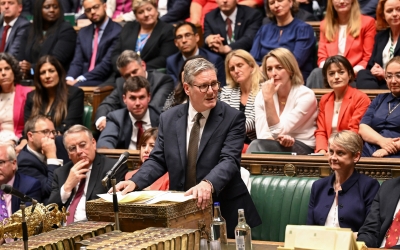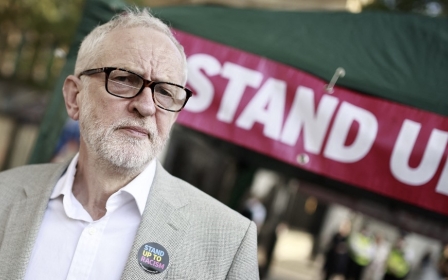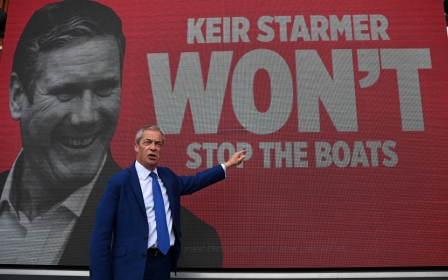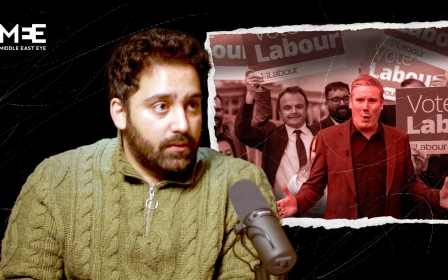Does Labour even care about regaining the trust of British Muslims?

“The fight for trust,” said the UK's new prime minister, Keir Starmer, at last week's State Opening of Parliament, “is the battle that defines our political era.”
But only a week earlier, when explicitly asked about British Muslim voters losing trust in his Labour Party, he had deflected with a vague response about Labour’s “incredibly strong mandate”.
The chinks in Starmer’s battle armour came in the form of an unprecedented five independent MPs elected in former Labour safe seats, and a record low vote for a victorious party.
All the independents were endorsed by The Muslim Vote (TMV), a grassroots campaign launched after the major parties failed to back the Scottish National Party's Gaza ceasefire motion. Since the election, attempts have been made in the press to delegitimise the results through insinuations that independent MPs won because of “sectarianism”.
These are easily refuted - almost half of TMV’s endorsed candidates were not Muslim (in Sheffield, a Muslim Labour candidate was specifically not endorsed, in favour of a Green Party candidate), and successful candidates also campaigned on local issues and anti-austerity platforms.
New MEE newsletter: Jerusalem Dispatch
Sign up to get the latest insights and analysis on Israel-Palestine, alongside Turkey Unpacked and other MEE newsletters
More recently, independent MPs were sworn in using the non-religious affirmation, perhaps symbolically refuting the allegations of "tribalism". And though TMV was accused of promoting “religious and ethnic allegiances”, its candidates were not racially or religiously homogeneous, and represented a broad political spectrum - Greens, independents, Workers Party candidates and Liberal Democrats - all of whom were united over what they perceived as Britain’s complicity with an ongoing genocide against the Palestinian people.
Defeated supporters of Starmer have played into the narrative undermining TMV’s wins. Longstanding MP Khalid Mahmood framed himself as the victim of a “stitch-up”, after losing his seat in Birmingham Perry Barr to Ayoub Khan.
Mahmood accused TMV’s backers of having “no real place in the British community” and trying to unseat him “predominantly because I’ve stood up to these people”.
Deep-seated distrust
But Mahmood’s career has been dogged by his support for the Iraq war and opposition to an inquiry into the invasion.
He promoted the Trojan Horse hoax, which falsely alleged an Islamist takeover of schools in Birmingham. And his links to neoconservative think tanks, as a political council member for the Henry Jackson Society, and senior fellow at Policy Exchange, put him at odds with many left-leaning Muslim voters.
Voting in favour of the ceasefire motion could not rescue him from defeat, a fact which suggests a deep-seated local distrust of Labour’s positions.
The former MP for Leicester South, Jonathan Ashworth, has also employed a familiar script in his interviews, claiming to both Andrew Marr and Kay Burley that independent MP Shockat Adam was “elected on the basis of a foul and obnoxious lie that I was responsible for genocide”. He claims his opponent’s campaign was “run by a minority of bullies and loudmouths”.
The week before the election, Ashworth had pledged to “send… back” migrants “who shouldn’t be here… from countries like Bangladesh or wherever”, a comment that is unlikely to have scored him points with Leicester’s Bangladeshi community.
Shockat Adam has refuted accusations of bullying as “simply not true” and said “nobody expected [Ashworth] to wave a magic wand, and peace would prevail over the Middle East. What people wanted was their MP to speak out on their behalf, and they were met with silence.”
Their political records, and their subsequent reactions to losing, exemplify why Muslims in their respective constituencies lost faith in Ashworth and Mahmood in the first place.
Death threat
The asymmetry is clear: independents have been required to repeatedly condemn aggression unrelated to them, while their opponents have not.
During an election where emotions ran high, coverage of the abuse TMV and its candidates received was negligible: Workers Party candidate Jody McIntyre, who has cerebral palsy, condemned the “irrational hatred of disabled people” he experienced during the campaign; Leanne Mohamed spoke to me about virulent misogynist and anti-Palestinian abuse she constantly received online; while Adam’s canvassers were told that Leicester residents “would never vote for a P--ki”.
Last Friday, Ashworth criticised Adam for not attending parliament. Adam says he was speaking to police about a death threat made against him.
Needless to say, this feels like the fate of any political mobilisation undertaken by Muslims - in public discourse, peaceful protesters become “mobs”, engaging with the democratic process is “anti-democratic”, and political engagement becomes “sanitised Islamism”.
When asked how he would rebuild trust with Muslim communities, Starmer’s response was hazy: 'Where we didn’t secure votes, we’ll address that'
TMV’s successes have been met by one of two responses: bad faith rhetoric from Labour’s fallen heroes; or being shrugged off by those who have been re-elected, who enjoy a comfortable parliamentary majority without their support.
Both of these reactions point to one thing: the Labour Party does not want to address the real grievances of British Muslims.
When asked how he would rebuild trust with Muslim communities, Starmer’s response was hazy: “Where we didn’t secure votes, we’ll address that.”
This is unconvincing to Muslim voters, many of whom feel disillusioned with the two-party system. The first step must be to acknowledge this.
And as Foreign Secretary David Lammy shakes hands with a man who has been issued an arrest warrant by the International Criminal Court, the government continues to staunchly support a state under investigation for genocide.
Some have regarded the appointment of Richard Hermer as attorney general as an indication that Labour is willing to listen to robust legal advice, but as long as British arms are exported to Israel, Gaza remains an emotive issue for Muslim voters and beyond.
Muslim poverty
Labour can still win points with Muslims by tackling the broad, and reasonable, set of priorities supported by TMV: pursuing an ethical foreign policy, ensuring the protection of civil liberties, including the right to protest, and investing in the poorest communities across the UK (the 2022 Muslim Census showed that 50 percent of Muslim households live in poverty compared to 18 percent of the general population).
Many still feel the party lacks moral courage, and committing to abolish the two-child benefit cap, for example, would be an encouraging sign of putting principle first. The suspension of seven Labour MPs (now supported by the independents) who rebelled against the government’s position is troubling.
It is not the first time Starmer has been accused of authoritarianism. While courting votes, the party aligned itself with pro-Israel candidate Luke Akehurst, while deselecting Faiza Shaheen, who claimed she was “penalised for describing [her] experiences of Islamophobia”.
Back in 2022, the Forde report identified "a hierarchy of racism or discrimination" in the party, under which some forms of prejudice were not adequately dealt with.
At the time, the Labour Muslim Network (LMN) said: “Muslim members have consistently told us they feel Islamophobia often sits at the bottom of this perceived hierarchy”, and said the report strongly indicated “institutional Islamophobia” in Labour. The party must take this seriously.
The government can also engage with frustrated voters instead of ignoring them.
When Shockat Adam condemned intimidation of Labour candidates, he distinguished this from “robust questioning”.
Adam attributed local anger to the sense that “whether we like it or not, according to many human rights organisations, there is a genocide… if they are not going to be rightfully angry at that particular moment in time, when as humanity are we going to be angry?”
There are a myriad of issues affecting Muslims, which Starmer would do well to tackle.
But until Labour reckons with the reasons behind that anger, it cannot hope to win back trust so easily.
The views expressed in this article belong to the author and do not necessarily reflect the editorial policy of Middle East Eye.
Middle East Eye delivers independent and unrivalled coverage and analysis of the Middle East, North Africa and beyond. To learn more about republishing this content and the associated fees, please fill out this form. More about MEE can be found here.






